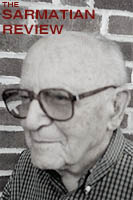| This Issue | Back Issues | Editorial Board | Contact Information |

From the Editor
September 2000
Vol. XX, No. 3
As Peter Novick pointed out in The Holocaust in American Life (1999), in the 1970s and '80s in the United States the Holocaust was shifted from the category of an historical event to the category of ideology. Novick's book may be interpreted as a call for a literature of bare facts rather than generalities about the Holocaust. Marcus Leuchter's story of survival is a collection of such facts. To survive in conditions of Nazi and Soviet occupation was a daunting task for Polish gentiles; to survive in Nazi-occupied Warsaw and Kraków was an incomparably more daunting task for Polish Jews. In conditions of the atomization of society which terror imposes, it took hundreds of people to hide one Jew or Jewess; Marcus Leuchter was fortunate enough to find not one traitor among those hundreds of Polish gentiles who knew about his background. At the same time, in conditions of mortal danger he helped many other human beings, gentiles and Jews alike, and he showed the kind of courage and nobility of spirit that is rare in peacetime, let alone under terror. If anyone deserves recognition for courage and humaneness in situations where hope is all but impossible, it is Dr. Leuchter.
His account also makes clear, one more time, that the planners of the Holocaust displayed the kind of ingenuity that is alien to American thinking. They started with separating Jews from gentiles in a move that was not instantly perceived as totally disastrous by a great many Jews. In the Ghetto, the Jews had their own Jewish police and Jewish administration, a benefit of which they were deprived in pre-war Poland where the civil and police authorities were mostly gentile. Likewise, deportations to the camps were organized in such a way that Jewish clerks and Jewish police (under the supervision of the Nazis of course) were in charge of the process of registering, filling out forms, organizing logistics and marshalling people to railway carriages. Since fellow Jews were in charge of the operation, many Jews trustingly went on and volunteered for "labor" or "resettlement in the East."
The mechanism of the Holocaust should teach humility to us all. How easy it is to participate in a process which ultimately leads to the destruction of other human beings. And how few acts of heroism happen in circumstances when agreeing to be a clerk in the Ghetto meant better food and perhaps survival of one's family, and when agreeing to shelter a Jew--let alone a Jewish family--on the "gentile" side meant death if caught. In his generosity, Dr. Leuchter remarks that his Holocaust experience taught him that there is something good in every man and woman. But the ease with which human beings slip into the survival mode where "everything goes" if it is necessitated by survival--underscores the importance of institutions and rituals that mitigate human ability to surrender to evil.
On the margin of Dr. Leuchter's splendid testimony, it should be noted that speaking of "Jews and Poles" is troubling, since it implies that Jews cannot be Poles. Rather, in the spirit of Polish multiculturalism that goes back to the sixteenth century, one should speak of Jews and gentiles, or Polish Jews and Polish Christians.
Dr. Jazbec's paper reminds us that diplomacy is needed more than ever in the twenty-first century, and that nation states must have their sovereignty trimmed down by international agreements to assure a modicum of security in the postcommunist world. Dr. Jazbec rightly defends the nation state, pointing out that its multiplication in the post-communist period indicates its usefulness for maintaining peace and decreasing international tensions.
Among reviews, one dealing with Dr. Marc Ben-Joseph's book on Bank Krajowy merits attention. Professor Anna Dadlez' Letter is a testimony to the generation of Polish gentiles who came to the United States after World War II, or approximately at the same time when Dr. Leuchter did. Professor Cienciala's Letter closes our discussion of Professor Gella's book. And who would not be cheered up by Rodi Wout's "Sarmatian" story?
Finally, we thank all those who joined our readership in the last several months.
Back to the September 2000 issue
The Sarmatian Review
sarmatia@rice.edu
Last updated 10/05/00